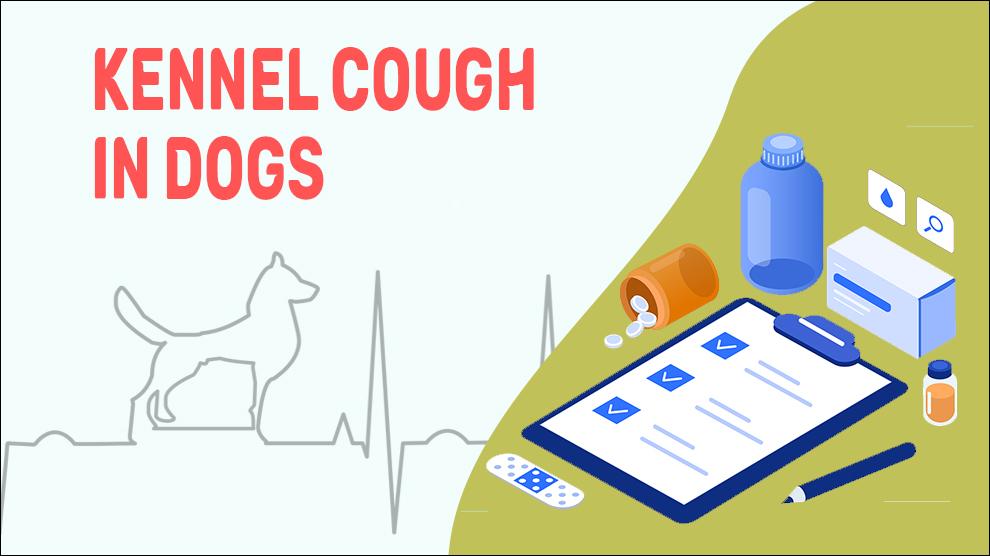Dogs "catch" kennel cough when the bacteria or virus particles creep their way into the respiratory tract just like human colds. Kennel cough can be caused by several viruses and bacteria, often at the same time.
Broadly, the term ‘Kennel cough’ covers any canine contagious condition where one of the major clinical signs is ‘coughing’. Also referred to as ‘Infectious tracheobronchitis’, this term suggests the location of the infection is the bronchial tubes and trachea (or 'windpipe').
Kennel cough is a highly contagious, multifactorial but self-limiting disease that results from acute or chronic inflammation of the bronchial airways and trachea. Kennel cough can be caused by several pathogens and with there is a possibility of co-infections (i.e. infection with more than one bacterial or viral agent), so these are often mentioned broadly as the ‘Canine Infectious Respiratory Disease Complex (CIRDC)’.
Kennel cough is often secondary to viral infection of the respiratory system. The disease spreads rapidly among susceptible dogs housed in close quarters, such as kennels, grooming facilities, rescue centers, or veterinary hospitals.
Symptoms Of Kennel Cough
- Dry, harsh cough (described as a 'goose honk')
- Acute onset of a nonproductive cough
- Fever
- Runny eyes and nose
- Rapid/labored breathing
- Wheezing
- Loss of appetite
- Swollen tonsils
Severe cases
- Dogs try to clear their throat or spit up or gag, often mistaken as vomiting.
- Bronchopneumonia
- Tachypnea
- Respiratory distress
- Pyrexia
Treatment Options For Kennel Cough
- There is no specific treatment for kennel cough and most of the cases resolve without treatment (like the Common Cold in humans)
- Treatment is general supportive care (rest and fluids)
- A broad-spectrum antibiotic for any secondary bacterial infections from occurring
- Cough suppressants (Balminil, Benylin, Delsym, Robitussin)
- Quarantine with hospitalization for the more severe/complicated cases
- Immunosuppressive or anti-inflammatory medications
Home Remedies For Kennel Cough
- Keep the affected dog in isolation and after they are deemed recovered for at least few more weeks.
- Make sure that your dog gets appropriate vaccinations.
- Limit the exposure of puppies to other dogs that may be infected or carrying the virus until they have completed their puppy vaccination series.
- It is advisable to keep your dog’s bedding clean and sterile.
Prevention Of Kennel Cough
Vaccination guidelines:
Considering the risk factors facing your pet, check with your vet how often your dog should get kennel cough shots - it’s vital that your pups get the right vaccines at the right time.
Bordetella vaccine –
- First vax (6-8 weeks)
- Second vaccination (10-12 weeks)
- intranasal and oral kennel cough shots – every 1 year
- The booster shots are effective for one year
Affected Breeds Of Kennel Cough
There is no breed disposition
Boxer, and other small breeds of dogs are most documented.
Additional Facts For Kennel Cough
Incubation period: 3–7 days (with a range of 2–10)
Transmission:
- aerosolization of microdroplets of respiratory secretions.
- Oronasal contact with other dogs (most common) or fomites and caregivers(less common)
Bacteria
- Streptococcus equi (subspecies zooepidemicus)
- Mycoplasmas (Mycoplasma cynos)
- Bordetella bronchiseptica
Canine viruses
- Adenovirus 2
- Distemper virus
- Parainfluenza virus
- Bocavirus
- Influenza virus
- Coronavirus (pantropic strain)
- Respiratory coronavirus
- Pneumovirus
- Hepacivirus
- Herpesvirus
- Reovirus
Morbidity:
- Canine influenza virus and canine distemper virus infection symptoms start off with symptoms similar to Kennel cough.
- Signs vary from loud cough and slight fever to hemorrhagic viral pneumonia
- Most viruses are cleared in 7- 15 days, but sometimes, clinical signs may last for even weeks.
Mortality:
Young dogs have the highest mortality rate (usually it ranges from 1%–to 5%)
Vaccine:
- Follow the vaccination protocol prescribed by the vet
Prognosis:
Kennel cough is rarely fatal and will usually go away on its own. But still, medications are usually given to prevent the condition from worsening and to help your dog recover faster.
When To See A Vet
Contact your vet right away, if you notice any of the following:
- If your dog doesn't improve within the expected amount of time, make sure to follow up with your veterinarian
- Ongoing kennel cough infection, when it becomes serious can lead to pneumonia
- If your dog at any time has symptoms of Tachypnea, listlessness, or continued fever
Food Suggestions For Kennel Cough
- 70% animal-based protein and fat (meat, organ meat, cottage cheese, eggs, yogurt) and 30% low glycemic (low-sugar) vegetables – Carrots, Greens (spinach, kale, collards, beet).
- Raw diet:
- 50% - good meats include ground pork, beef, chicken, turkey, or green tripe (cow stomach or unbleached tripe).
- 50% - Add raw meaty bones (one-half of the diet for the calcium).
- Low-carb dog food/ peas, sweet potatoes, squash, yams, pumpkin, etc.
- Antioxidants- Blueberries, blackberries, Steamed broccoli, spinach, cooked yellow squash, kale, and green beans.
- Vitamin C and bioflavonoids: Brussel sprouts, spinach, broccoli, kale, pineapple, papaya, and strawberries, etc.
- Iron: Lean meats like ground beef and lamb, fish, such as sardines and salmon, pumpkin, carrots, and leafy greens.
Conclusion
In most cases, kennel cough will settle without treatment, drugs may minimize symptoms or speed recovery amid infection.
Keep informed about outbreaks of infections in your community. So that, if there’s a kennel cough or any other kind of infection, you’ll get updates about how to keep your dog and yourself safe until the outbreak passes.

















